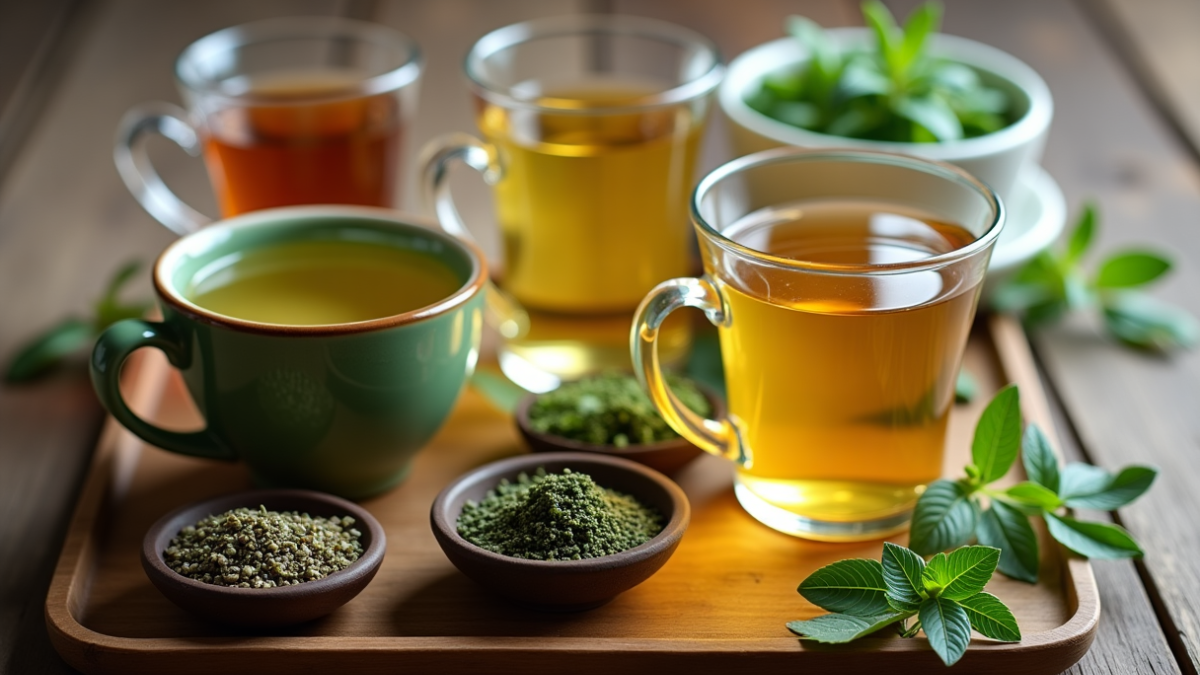At some point we have all experienced fullness, gas, bloating, or heartburn after eating. These occasional issues are simply part of life, but when they happen more frequently and begin to interfere with daily life, the effects on our health and disposition can add up.
In such a situation, most people resort to medicines or soda drinks, but these solutions are not right for a long time. For centuries, an easy and effective solution has been adopted in Ayurveda and naturopathy herbal tea.
It does not contain caffeine like normal tea or coffee, but it contains natural elements that soothe the stomach, strengthen the digestive system, and maintain the balance of the body.
In this article, we will learn about 7 of the best herbal teas that soothe the stomach, improve digestion, and keep the whole body healthy.
1. Ginger tea – stomach’s best friend

Why it is effective:
Ginger has been viewed as a gift to digestion for centuries. The properties gingerol and shogaol activate digestive juices, quicken stomach emptying, help lessen gas and nausea.
Advantages:
- Immediate relief from indigestion or gas
- Less vomiting or nausea, after eating a heavy meal or during travel.
- Increased appetite and improved metabolism.
How to drink:
- Chop some fresh ginger and boil it in water for 5–7 minutes.
- Strain and drink lukewarm. You can add lemon and honey if you want.
Example: Many people drink ginger tea before a long car journey or plane journey so that motion sickness does not occur and the stomach also feels light.
2. Peppermint tea – cool stomach massage
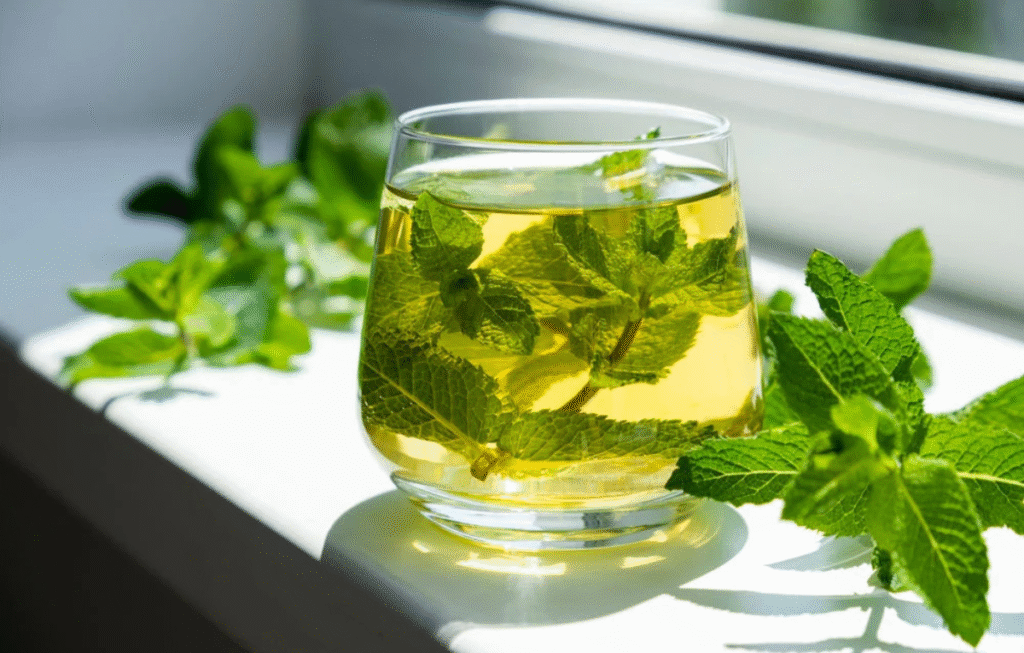
Why it is effective:
Menthol from peppermint helps to relax the muscles of the stomach so that it reduces cramps and bloating. Gas exits easily, and you feel lighter in your stomach.
Advantages:
- Reduces the feeling of bloating and cramps.
- Helpful in conditions such as IBS (Irritable Bowel Syndrome).
- Freshens breath after eating.
How to drink:
- Soak dried mint leaves or tea bags in hot water for 5 minutes.
- You can also drink it after cooling it if you want.
Example: People who have high acidity should drink peppermint tea in limited quantities, as sometimes it can increase acidity.
3. Chamomile Tea – Soothing for both stomach and mind
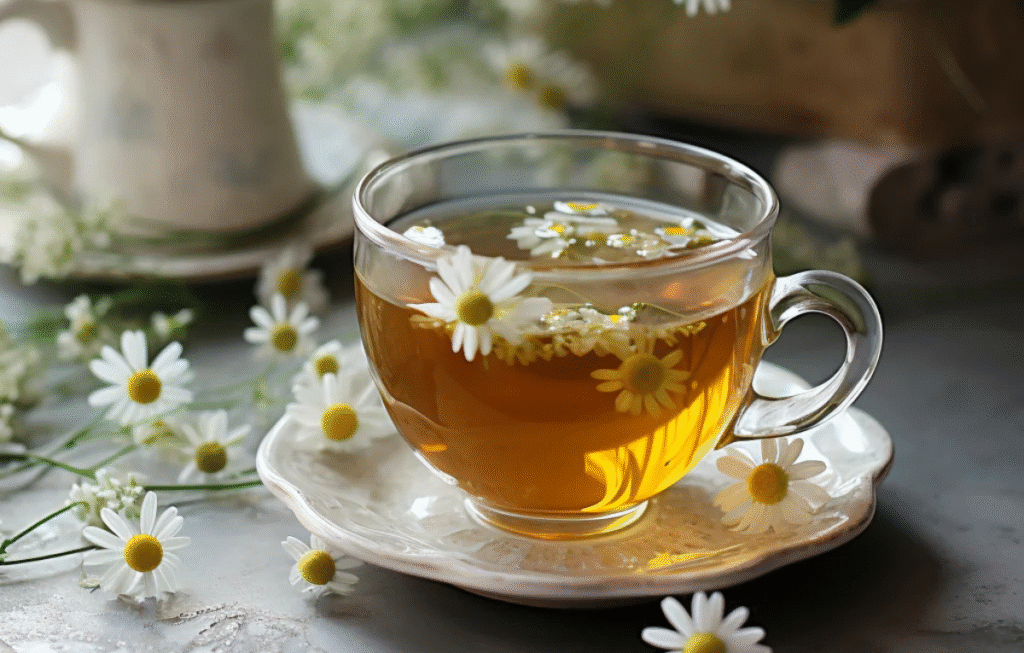
Why it is effective:
Chamomile flowers are well known for the calming effects. Chamomile reduces stomach bloating, reduces cramps as well as calming a digestive upset resulting from stress.
Advantages:
- Reduce indigestion and acidity.
- Soothe stomach cramps and pain.
- Improve digestion by reducing stress.
How to drink:
- Infuse dried chamomile flowers in hot water for 5–10 minutes.
- Best to drink before bedtime.
Example: If you feel heavy in the stomach after dinner and can’t sleep, chamomile tea will give you both stomach relief and deep sleep.
4. Fennel tea – a traditional way to relieve gas
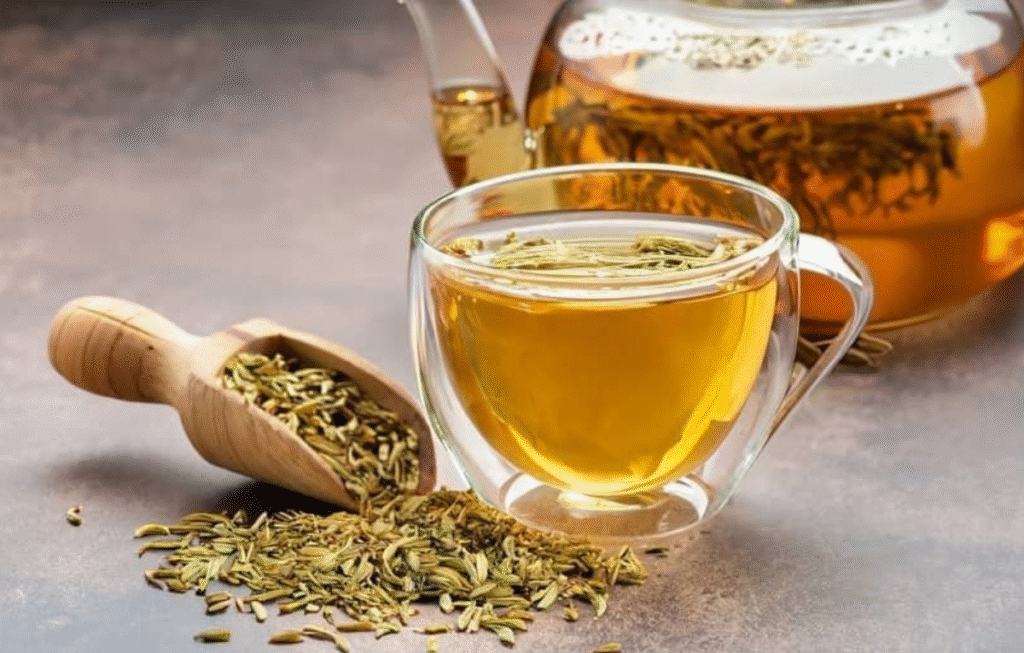
Why it is effective:
Fennel is a hallmark of Indian kitchens. The oils present in it relax the digestive muscles and expel trapped gas.
Advantages:
- Relief from gas and bloating.
- Helps in quick digestion after a heavy meal.
- Helpful in relieving stomach pain and gas (in mild quantities) in small children.
How to drink:
- Lightly crush one teaspoon of fennel and keep it in hot water for 10 minutes.
- Strain and drink lukewarm.
Example: Fennel is served after meals in almost every restaurant in India. It is not just for mouth freshening but also a tradition to improve digestion.
5. Licorice tea – calms the stomach
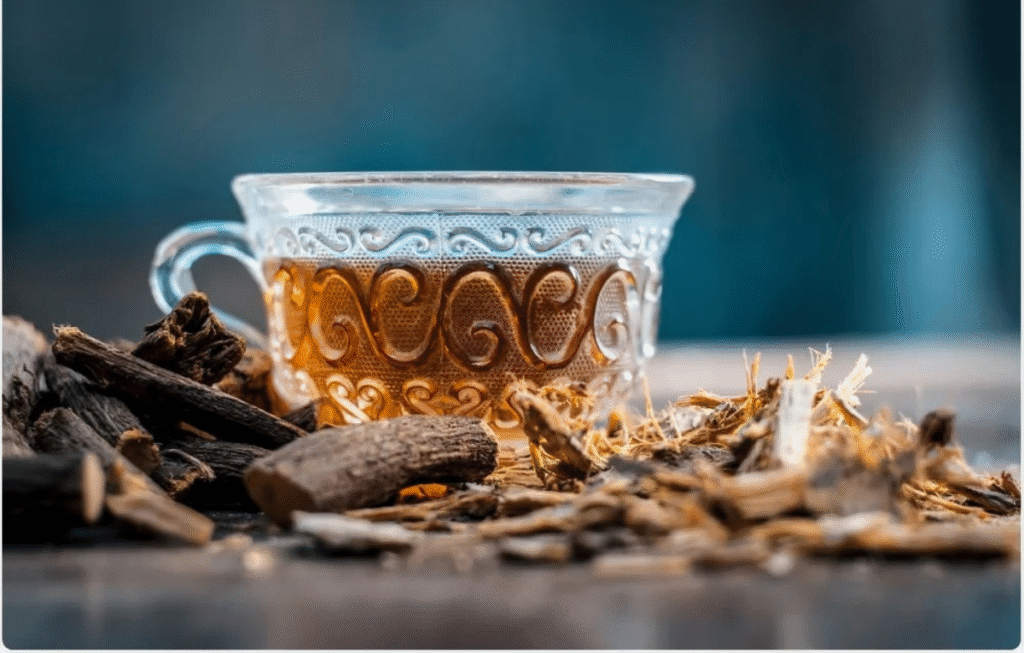
Why it is effective:
Licorice is a natural anti-inflammatory. In the digestive tract it coats the lining of the stomach reducing all irritation and inflammation.
Advantages:
- Relief from acidity and heartburn.
- Reducing inflammation of the stomach and intestines.
- Normalizing bowel movements.
How to drink:
- Boil licorice root in water for 5–7 minutes.
- Drink it warm, but avoid large amounts, as it may increase blood pressure.
Example: Those who have high blood pressure problems should consult a doctor before drinking licorice tea regularly.
6. Dandelion Tea – A Natural Detox Companion
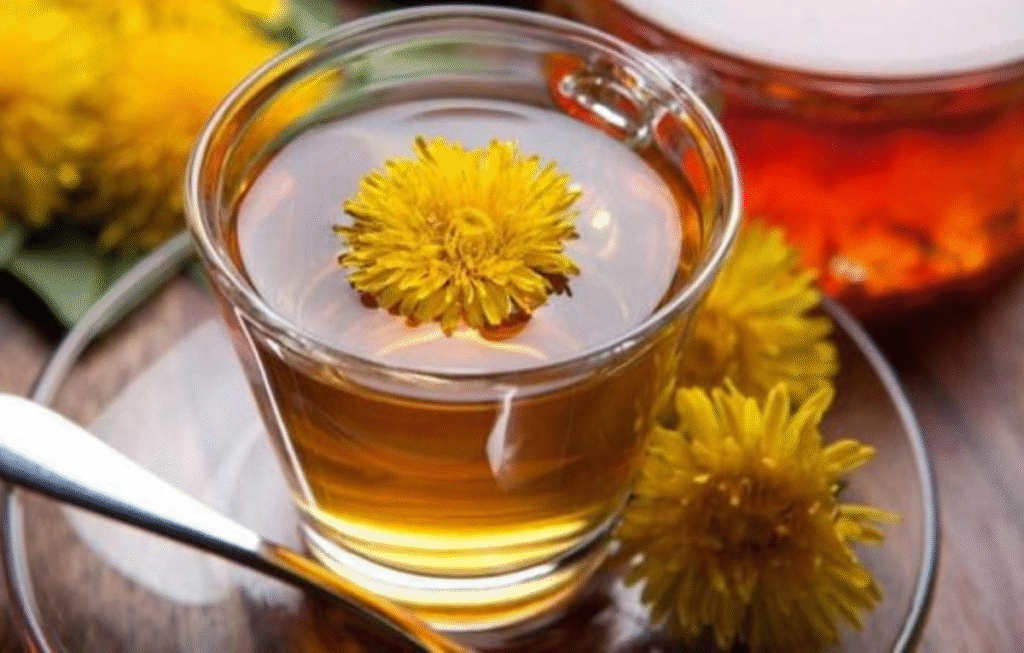
Why it is effective:
The roots and leaves of dandelion plants are somewhat of a laxative and liver detoxifiers. Dandelion tea promotes bile juice, resulting in better fat digestion because it assists with breaking down fats.
Advantages:
- Improves liver function.
- Relieves mild constipation.
- Detoxifies the body and improves digestion.
How to drink:
- Simmer dried dandelion roots or leaves in hot water for 5–10 minutes.
- Drinking once a day is enough.
Example: Dandelion tea is included in many detox diets, as it helps cleanse the liver and keep the stomach light.
7. Lemongrass Tea – A Combination of Refreshment and Digestion

Why it is effective:
Lemongrass has anti-microbial and anti-inflammatory properties. It eases irritation in the stomach, suppresses gas and hydrates the body. It has a lemony smell and has a refreshing brain quality.
Advantages:
- Reduces stomach pain and cramps.
- Relief from acidity.
- Detoxifies and cools the body.
How to drink:
- Chop fresh lemongrass stalks and boil in water for 5–7 minutes.
- You can also add ginger or mint to it and drink it.
Example: Drinking cold lemongrass tea in summers also improves digestion and cools the body.
Additional tips to improve digestion
Herbal teas are effective, but their effects are enhanced with specific lifestyle changes.
- Eat small and light meals—eating small amounts every couple of hours is much better than eating a few large meals.
- Chew food well— when we chew food properly, we are actually putting less pressure on the stomach.
- Drink enough water— namely, water will help keep your digestive juices flowing.
- Reduce coffee, alcohol, and cold drinks.
- Take a short walk after meals—a short walk after eating will speed up the digestion process naturally.
- Lower stress levels—yoga, meditation, and slow deep breathing can lower your mental stress levels and even improve digestion & absorption of nutrients.
How to add herbal teas into every day life
- Start with 1 cup a day and work your way to 2–3 cups.
- Choose different herbal teas ginger in the morning, fennel in the afternoon and chamomile at night.
- Do not use too much sugar; use honey instead whenever possible.
- Try different types of teas throughout the week to reap different benefits.
Conclusion
Herbal tea is not just a drink, it is also a medicine from the earth for the body and mind. Ginger’s heat, mint’s coolness, chamomile’s sedative effects, and lemongrass freshness and lightness are some of the herbal elements that help your body channel food better and feel light and airy.
If you are annoyed with constant and daily small aches like gas, heaviness, or acidity, enjoy a cup of herbal tea rather than a cold beverage or a cup of coffee. I assure you that within minutes you will not only feel better but you will continue to feel better through your digestion.
FAQs:-
Which herbal tea is best for digestion?
Ginger and peppermint teas are considered the most effective as they reduce bloating, gas, and indigestion quickly.
When is the best time to drink herbal tea for digestion?
The ideal time is after meals, as it helps improve digestion, reduce heaviness, and calm the stomach.
Which herbal tea is good before bedtime for digestion?
Chamomile tea is perfect before bed as it soothes digestion and also promotes relaxation for better sleep.
Medical Disclaimer
The information provided on Health Tips India is intended for educational and informational purposes only. It should not be considered a substitute for professional medical advice, diagnosis, or treatment.
Always consult a qualified healthcare professional before making any health-related decisions or changes to your diet, exercise, or medical routine.
SamhithaHealth & Wellness Content Writer
a Health & Wellness Content Writer with over 6 years of experience creating research-based health articles. She specializes in nutrition, weight management, diabetes care, skin health, and healthy lifestyle practices. Here content is carefully written using trusted medical and scientific sources to ensure accuracy and clarity for readers.

